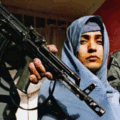218 - La clandestinidad del burka (1/2)
(MÚSICA AFGANA)
MALALAI Los de la Alianza del Norte son iguales que los talibanes... Dicen que estoy contra el islam... Dicen que soy comunista... Son los señores de la guerra...
MADRE Malalai... te llamarás Malalai como la guerrera que llevó a nuestros hombres a la victoria frente a los ingleses.
Tú serás valiente, luchadora como ella.
NARRADOR Malalai Joya nació el 25 de abril de 1978, en Ziken, una pequeña aldea de Afganistán. Al año siguiente, los soviéticos invadieron el país que se vio envuelto en la violencia y las guerras tribales.
MADRE Tenemos que huir... nos matarán.
PADRE Vamos a Irán, hay un campo de refugiados.
NARRADOR Cuando tuvo cuatro años, Malalai con su padre y su madre, huyeron a Irán y luego a Pakistán... Desde ese tiempo, escaparon de Afganistan unos tres millones de refugiados.
(MÚSICA PAKISTANÍ)
NARRADOR A los 16 años, Malalai se convirtió en activista social. Estudiaba y enseñaba a los niños y a las niñas refugiadas del campamento pakistaní.
MUJER Malalai, los niños tienen miedo. Y hambre..
NARRADOR En 1988, los soviéticos abandonaron Afganistán. El país se sumergió, durante 8 años, en una guerra civil entre más de 20 tribus, lideradas por guerreros musulmanes, los temibles mujahidinis.
NARRADOR En 1996, los talibanes tomaron Kabul, la capital de Afganistan. La vida de las mujeres se convirtió en un infierno.
VOCES DE HOMBRES EN PLANOS No pueden trabajar... No pueden andar descubiertas... Burka... Burka... No pueden estudiar... Ni salir solas... Ni manejar carros... ¡No, no, no!
NARRADOR Las mujeres, bajo la sharia, ley islámica fundamentalista, perdieron todos sus derechos. Los talibanes, de la etnia pashtún, venían a “purificar la sociedad”.
NARRADOR Malalai Joya regresó a su país con una organización de apoyo a las mujeres y siguió dando clases, esta vez de manera clandestina.
MALALAI La mayoría de mujeres afganas odiamos la burka, ese vestido que nos cubre de pies a cabeza. Si no lo hacemos, los talibanes nos violan y nos matan. Yo también llevo un burka por mi propia seguridad. Además, así puedo llevar libros escondidos para las mujeres.
NARRADOR En octubre del 2001, las tropas norteamericanas y británicas invadieron Afganistán con el pretexto de los atentados del 11 de septiembre en Estados Unidos.
BUSH Afganistán protege a Al Qaeda. Atacaremos las instalaciones militares de los talibanes y sus campos de entrenamiento de terroristas.
NARRADOR Para entonces, Malalai se había convertido en dirigenta comunitaria. Escondida, seguía animando a las mujeres a oponerse a la sharia.
MALALAI Los talibanes no gobiernan oficialmente, pero siguen imponiendo el terror: cierran escuelas, tiran ácido a las niñas que estudian. Las viudas tienen prohibido trabajar y vagan por las calles pidiendo limosna...
MALALAI Estamos entre dos enemigos: los talibanes y los mujahidines por un lado, y las fuerzas de la OTAN y Estados Unidos por otro.
NARRADOR Esta historia continuará.

